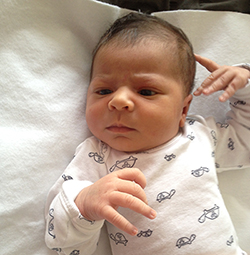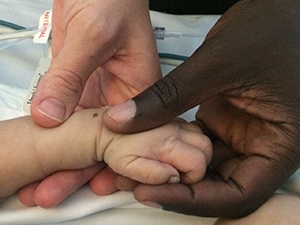Parents share heartfelt letter honouring baby son who gave life through organ donation
THE parents of a Kenyan-American baby boy who became the UK`s youngest lung donor have written a heartfelt letter honouring their son and sharing their experience as parents of an organ donor.
22nd December 2016

THE parents of a Kenyan-American baby boy who became the UK`s youngest lung donor have written a heartfelt letter honouring their son and sharing their experience as parents of an organ donor.
Baby Theodore "Theo" Omondi* was treated in a private UK hospital after suddenly falling ill earlier this year. When doctors were unable to save him, his parents asked if organ donation would be possible.
Theo died aged 41 days and went on to save the lives of two people in the UK, including Imogen Bolton, who was just five-months-old when she had her lung transplant. In October, Imogen`s family shared with The Sun the wonderful news that she was back home, recovering well.
Theo`s parents are now making their story public and sharing the comfort they found through donation. They also expressed their thanks to the hospital and staff who treated Theo and to NHS Blood and Transplant`s
specialist nurses and staff who supported them through the organ donation process.
In an open letter Theo`s parents, who wish to remain anonymous, said:
"We are the parents of the little baby boy, Theo, who shared his life with Imogen. We search for our son`s presence everywhere and every day. Now we have known one of the brightest places in Imogen. For that we thank Imogen and her family for sharing this special story. A once in a lifetime chance meeting of two little people bravely and beautifully fighting for life.
Some people have spoken of how they are grateful to the donor family for making such a difficult decision at a difficult time. For us, it was only and still is a difficult time, however it was never a difficult decision to support Theo to make his donation. We believe he would have wanted to help others if he had been able to grow up and make the decision himself. We are proud of what Theo could do not just for Imogen, but also for a young adult who now runs their body with his two tiny kidneys. We wait to hear of potentially six more people who may receive Theo`s liver cells for more healing and sharing of his life.
We know that every breath Imogen takes is a breath for our son.Every birthday Imogen celebrates is also a celebration of Theo`s birth. We imagine how perhaps someday Imogen and Theo can blow out his birthday candles together. Thinking about that physical act leaves us in quiet and reflective awe of everything surrounding and everything forever following the time we shared with our son.
Despite our deep sadness, we want to believe Theo is trying to show us his light and love as much as we are trying to find ways to give him our love, albeit in a different way than parents normally do.We hope Theo`s friends who live with him now and those who hear his story are inspired to be better people, because he has made us better people, too."

Right now across the UK there are 6,500 people - including 150 children - living a life in limbo, waiting for a call that will change their lives. Sadly a shortage of donors means too many people die before they get the transplant they need.
In the last 12 months 452 adults and 11 children died waiting for a transplant. In the last five years 2,618 adults and 96 children died on the waiting list. Patients need well matched organs and while many children could receive an organ from an adult, for example kidneys or liver, for some organs, such as hearts and lungs, the size of the donor and organs is very important.
While most people (81%) say they support organ donation, only around a third of people in the UK (23.3 million) have joined the NHS Organ Donor Register. Too many people admit they just "haven`t got round" to joining yet. **
Sally Johnson, NHS Blood and Transplant Director of Organ Donation and Transplantation said: "Our thoughts are with Theo`s parents and his wider family. They are rightly very proud of the wonderful gift their baby son has been able to give to others. It is incredibly generous to then share their thoughts and the comfort they feel knowing Imogen and her family and other recipients now have hope and life. Their compassion when faced with the terrible tragedy of losing their son, should stand as an example to us all.
"I hope their brave decisions inspire us all to have the courage to follow their example if faced with the death of a loved one and to support organ donation. This Christmas, we are asking everyone who wants to be an organ donor to take just a few minutes of their time to join the NHS Organ Donor Register and share their decision with their family."
There is no age limit to joining the register - and everyone is encouraged to have a conversation with their family about organ donation. Thanks to people donating after their deaths, over the last year 3,566 potentially life-changing transplants have taken place.***
Imogen`s parents Hayley and Jason Bolton said: "There are no words to express how grateful we are to Theo`s family for the amazing decision they made, which has saved our beautiful Imogen's life. Without their incredible gift, Imogen wouldn't be here.
"Theo lives on through Imogen, and when she hits her different milestones our family will be celebrating not one life but two.
"Organ donation save lives and we would encourage everyone to think carefully about signing up to the register."
- Join the NHS Organ Donor Register today. And tell your loved ones that you want them to support you donating if you can help others when you die - don`t leave anyone in any doubt about your decision.
- www.organdonation.nhs.uk
#timetosign #organdonation
Theodore Omondi are first and middle names, no surname is given for publication.
Ends
Further information:
- As at 31/10/16
- ** In a Kantar Public online survey of 1,001 adults in England (12-19 September 2016):
- When asked if they supported organ donation in principle: 45% said they strongly supported and 35% said they supported; 16% said they neither supported nor opposed; 1% said they opposed in principle and 3% said they didn`t know.
- When asked if they would be willing to donate: 55% said they would definitely donate all or some of their organs if possible; 27% said they consider donating some or all of their organs if possible; 14% didn`t know and 4% definitely wouldn`t.
- Of those who said they were willing to donate, but not registered on the organ donor register, 35% said they had not got around to it yet.
- (Data was weighted to be nationally representative of adults living in England by gender, age, ethnicity and social grade)
- ***Deceased donor transplants - as at 31/10/16
Contact:
For additional information please contact Maggie Stratton 07808 906440 pressoffice@nhsbt.nhs.uk
For out of hours enquiries please call: 0117 969 2444
Notes to editors:
NHS Blood and Transplant is a joint England and Wales Special Health Authority. We are responsible for ensuring a safe and efficient supply of blood and associated services to the NHS in England. We are also the organ donation organisation for the UK and are responsible for matching and allocating donated organs.
We are an essential part of the NHS and take pride in saving and improving lives by making the most of every voluntary donation, from blood and organs to tissues and stem cells.
Our work would not be possible without our donors - ordinary people doing extraordinary things by saving and improving the lives of others.
It is quick and easy to join the NHS Organ Donor Register. Visit www.organdonation.nhs.uk or contact our 24 hour a day donor line - 0300 123 23 23.
The register records your decision on whether you want to donate your organs and/or tissue after your death to save and improve the lives of others. It is used by authorised medical staff to establish whether someone has registered an organ donation decision.
Letting your family know your organ donation decision will make it much easier for them to support what you want.
Every day across the UK around three people who could have benefited from a transplant die because there aren’t enough organ donors. We need more people to agree to organ donation
Anyone can join the NHS Organ Donor Register, age and medical conditions are not necessarily a barrier to donation.
One donor can save or transform up to nine lives through organ donation and transform even more by donating tissue.
There is a particular need for more black and Asian organ donors. Patients from Black, Asian and Minority Ethnic (BAME) communities are over-represented on the transplant waiting list. More than a quarter (26%) of those on the waiting list are Black, Asian or Minority Ethnic while a 1/3 of people on the kidney waiting list are from these communities. People from Black and Asian communities have a higher incidence of conditions such as diabetes and certain forms of hepatitis, making them more likely to need a transplant. Black, Asian and Minority Ethnic patients make up a third of the active kidney transplant waiting list. Although some are able to receive a transplant from a white donor, for many the best match will come from a donor from the same ethnic background. Black, Asian and Minority Ethnic donors are needed to improve the chances of these patients getting the kidney transplant they need.
Whilst there may be some individual concerns relating to religious or cultural practices, all the major religions support organ donation.